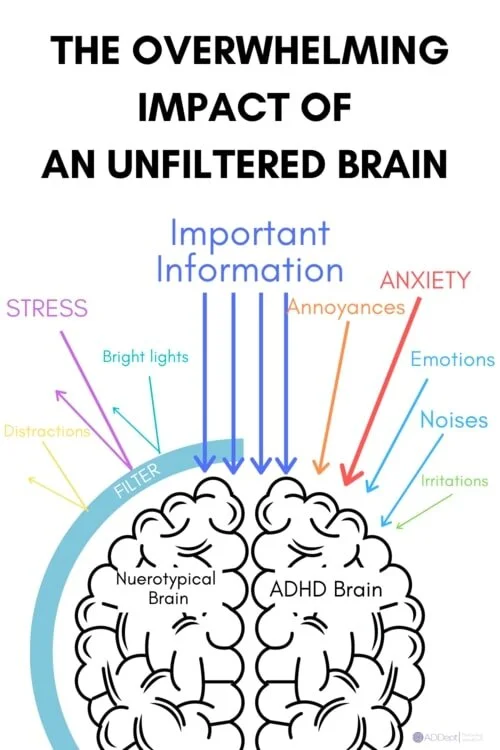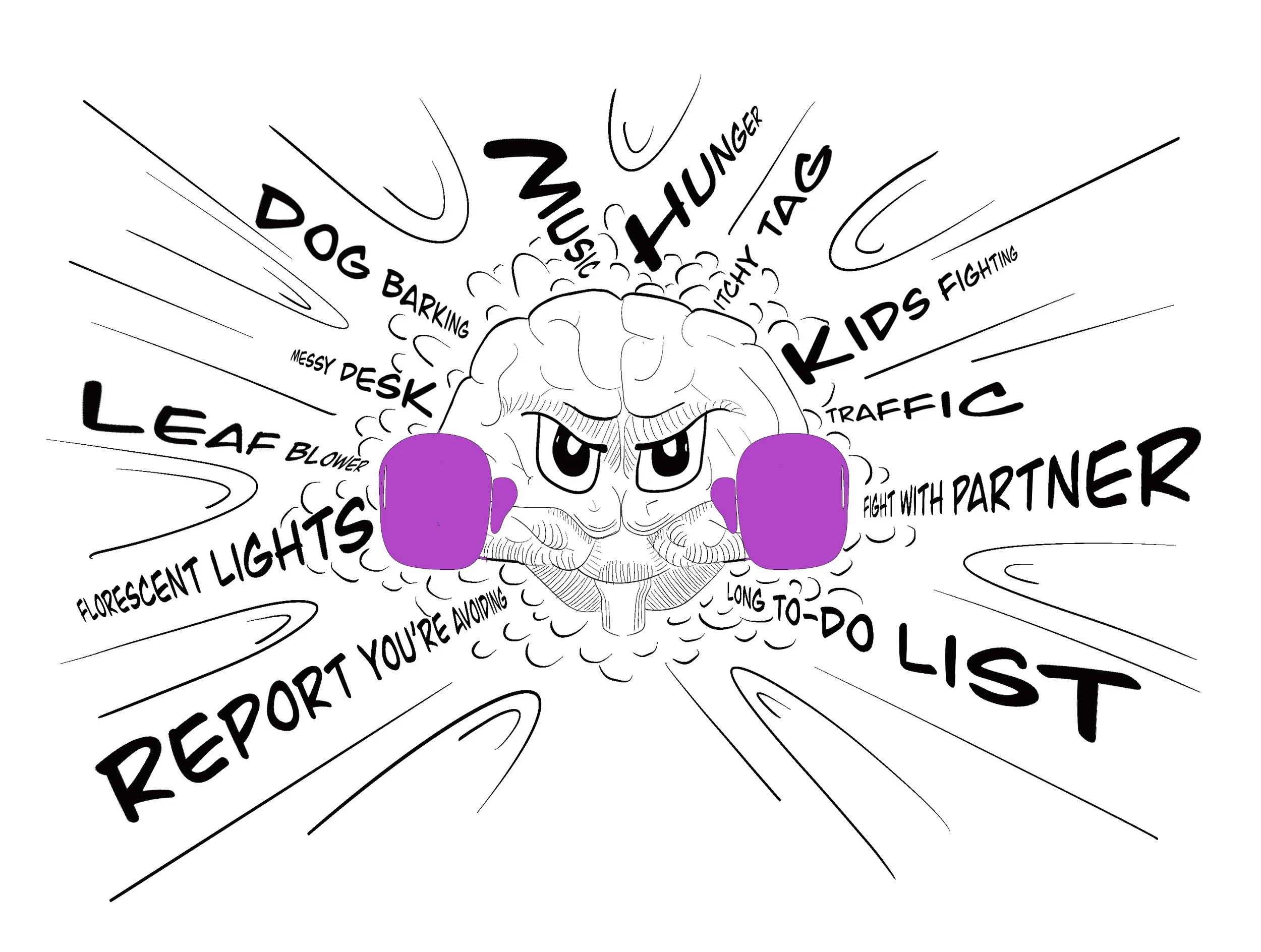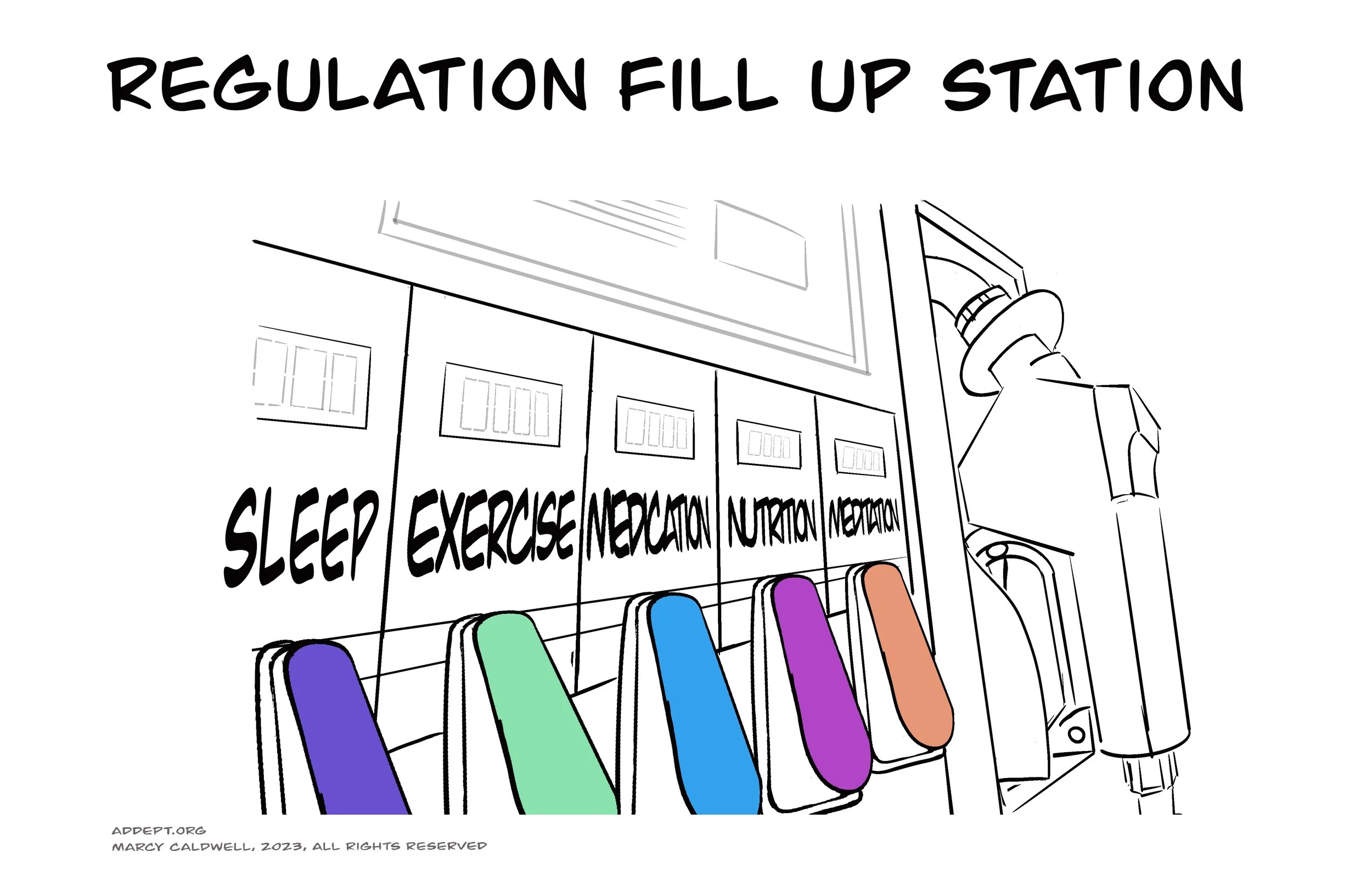Why We Can’t “Just Tune It Out”
Hypersensitivity, Sensory Sensitivity and the ADHD Experience [2025 update]
ADHD brains are wired to experience the world with extraordinary intensity—sounds, textures, and emotions flood in without a filter, turning everyday stimuli into a constant stream of "too much." While this hypersensitivity can be painful, it’s not a flaw- it’s part of your brain’s unique wiring, fueling creativity, empathy, and a knack for noticing details others miss. While you can’t switch off this heightened awareness, you can soften its edges with targeted strategies and environment tweaks. Let’s explore how to honor your sensitivity, protect your peace, and thrive in your rhythm. 🌟
If you’ve ever wondered why your ADHD brain feels like it’s hosting a never-ending sensory parade—honking cars, scratchy sweater tags, and flickering lights included—you’re not imagining things.
While ADHD hypersensitivity is real and often painful, it’s also neurobiological and far from a “flaw.” It’s your brain’s unique wiring, dialing up the volume on sensations and emotions that others barely notice.
While all these sensations and emotions can be painful (it’s also part of what makes you creative, intuitive, and deeply empathetic!), you can learn to thrive with it.
Let’s unpack why ADHD brains are sensory sponges—and how to reclaim calm in a world that often feels “too much.”
What are Hypersensitivity, HSP or Sensory Sensitivity?
Hypersensitivity, also known as hyperempathy syndrome, HSP (highly sensitive person), and sensory sensitivity, isn't "being too sensitive" – it's a real deal neurobiological thing.
People with ADHD brains often experience the world in a more intense way, both physically and emotionally. This can lead to strong reactions like frustration, overwhelm, and even physical symptoms like headaches, stomachaches, and even rashes.
All too often, people with hypersensitivity are made to feel crazy. They are told, “You’re too sensitive” or “You need to toughen up.” But the sensitivity that the ADHD brain experiences isn’t the result of a character flaw- you can't be toughened out of it. It's a neurobiologically based symptom. In fact, research suggests that the entire system of people with hypersensitivity is extra sensitive, making them more prone to biological sensitivities like asthma and allergies.
Think you might have ADHD?
Take a free online assessment to find out.
(Takes 3 minutes)
TAKE THE QUIZADHD hypersensitivity/ HSP/ Sensory Sensitivity symptoms:
Hypersensitive ADHD brains are more likely to get flooded and extremely bothered by:
Loud, sudden noises
Bright or flashing lights
Fast objects
Strong odors
Too much information
Coarse fabric or tags
Clothing that's too tight
Hair rubbing against skin
Too many people (can cause claustrophobia)
Strong feelings (their own or other people’s)
Minor disagreements or frustrations
Tactile sensitivity
When the ADHD and HSP brain is flooded by these sensations, they are likely to feel overwhelming feelings of:
Rage
Frustration
Despair
A desire to flee or hide
Crying
Anxiety
Physical symptoms like rashes, GI distress and headaches
Why ADHD Brains are Wired for Sensory Overload
You know those foot-in-the-mouth, accidental honesty-bomb moments? Like telling Aunt Mildred her prized sweater looks suspiciously like a clown threw up rainbows (whoops!). Or politely inquiring if your cousin was expecting... only to discover it was just a burrito baby bump (awkward!).
We can chalk many of those moments up to a “lack of filter.” And it’s easy to see that lack of filter in things coming out of the ADHD brain—the interruptions, the sudden outbursts, and the awkward jokes.
But here's the secret: that lack of filter works both ways. It lets everything in – every honking car, flickering light, and itchy sweater tag.
Neurotypical brains, bless them, have a built-in "mute button" for constant stimuli. They might notice their watch for a second, but then it fades into the background. Same with noises, smells, and the general sensory buffet of life. Their brains filter out the unimportant stuff to focus on what matters.
The ADHD brain, however, is more like a wide-open receiver, picking up every single detail without pause or filter. This constant sensory barage keeps information streaming in, piling on top of each other until the system reaches peak overwhelm.
ADHD, Hypersensitivity and Sensory Sensitivity: What the Research Says
In spite of the fact that hypersensitivity abounds among ADHD brains, there is very little research on the topic. The research that does exist, however, agrees on several fronts.
ADHD brains are more likely to be BOTH hypo and hypersensitive
Yup, you read that right. Like so most things related to ADHD brains- they tend to fall to the extremes. So, ADHD brains are more likely to be either more sensitive or less sensitive to external stimuli than neurotypical brains. (1,2,3)
Women with ADHD are more likely than men with ADHD to be hyper/hypersensitive
Much more likely, actually. One research study found that 44% of women with ADHD and only 24% of men with ADHD reported hyper/hyposensitivity. (2)
The more ADHD your brain, the more sensitive it is
Just like ADHD, hypersensitivity exists on a spectrum. Research suggests that those spectrums seem linked- so the more significant your ADHD differences, the more significant your sensitivity will likely be, too. (1)
Emotional Sensitivities and ADHD
ADHD emotions are often stronger, more sudden, and more overwhelming. These heightened emotions then flood and overwhelm the ADHD brain, often causing people to act out in rash and seemingly irrational ways. But, when you look at what's really happening- it makes a lot more sense.
A system under siege:
Because the ADHD brain doesn’t have a filter for information, it's under constant siege from all the information, sensations, and environmental stimuli it receives.
This onslaught causes our body’s sympathetic nervous system, its fight or flight alarm system, to be on high alert- ready to help us fight off an attack, flee as fast as possible, or freeze with the hope that an assailant passes us by.
This type of preparation, though, leaves us interpreting the world as though it is poised to hurt us. So, any comment, any passing look, or any missed remark is more likely to be read as something intended to wound rather than accidental or unrelated.
An Emotional Sponge:
It’s not just sensory informantion that ADHD brain’s don’t filter. They also keep the floodgates open wide for emotions! That's right, ADHD brains are like human empathy sponges, picking up on every subtle change in someone's expression, every nervous twitch, and every sigh.
The upside? ADHD brains can be incredible emotional detectives, often reading people like open books before they even utter a word. Our down-to-earth friend feeling a little down? We got it. Our boss secretly stressed about that presentation? We can feel it!
But here's the rub: this superpower can also be a double-edged sword. Not only do we experience our own intense emotions, but we also soak up the feelings of everyone around us. It's like being an emotional sponge, constantly absorbing the joys and sorrows of others. While it fosters empathy, it can also be downright draining!
Zero to Sixty in an Instant:
The lack of filter that overwhelms the ADHD brain with sensations and other people’s feelings also struggles to filter internal emotions. So, when an ADHD brain feels a feeling, it feels it on full blast. ADHD brains tend not to regulate emotion (just like they don’t regulate attention or action either)- they either feel them entirely or not at all. It’s an on/off switch instead of a dimmer switch. So there is not just a little anger-- the system goes from “I’m fine” to full rage in an instant. Now, combine this with a system under siege, and the emotional issues with ADHD start to make more sense.
ADHD and Physical Sensitivities:
The lack of a filter in the ADHD brain means that it can’t adapt to sensations. So, rather than feeling that itchy tag in a shirt for a moment and then saying, “That’s not important,”- the ADHD brain never stops noticing the tag. All day long, it's trying to pay attention to the important things: your professor’s lecture, your wife’s grocery list, your boss’s most recent request. But that tag keeps coming back into awareness, and your focus has to ping pong- back and forth between the task at hand and the itch at the back of your neck.
The lack of filter in the ADHD brain goes for physical sensations too! Unlike a neurotypical brain that might say "meh, itchy tag" and move on, ADHD brains are like faulty smoke detectors – constantly blaring the alarm. Imagine trying to focus on a lecture or remember your wife’s grocery list while an itchy gremlin is having a rave on your back! Your brain desperately tries to ping-pong between that all-important thing you’re supposed to remember and the epic battle happening in your shirt.
But it's not just the constant awareness. It's the intensity. That scratchy sweater or the neighbor's barking dog or the flashing lights don't hit the ADHD nervous system like a minor annoyance – they storm in like sensory invasions! Here's where the ADHD brain's regulation issues come in again. We don't just experience the sensations; we get flooded by them. A light breeze feels like a hurricane, and a flickering light becomes a strobe show in a room of mirrors.
It's no wonder staying focused feels like an Olympic feat- our brains are constantly bombarded by a sensory assault course!
Can ADHD brains be cured of high sensitivity?
There's no specific treatment for hypersensitivity, and there isn’t anything that is going to make an ADHD brain no longer hypersensitive. And honestly, as painful as that is (and it is truly painful), there’s also a huge upside to the fact that ADHD hypersensitivity is here to stay.
Becuase the hypersensitivity of an ADHD brain is also part of what makes it intuitive, justice-sensitive, creative, and able to solve problems in novel ways. The fact that ADHD brains can’t filter out extraneous information is part of why it’s able to make connections that other types of brains can’t, and the fact that it doesn’t skip over the body language of the person that you’re talking to is part of why you know, intuitively, how they are feeling.
So, no. ADHD brain’s high sensitivity can’t be “cured,” and that’s a good thing. But that doesn’t mean that we can’t reduce its negative impact.
How to Reduce Hypersensitivity with ADHD:
Because hypersensitivity is due, in part, to the ADHD brain’s difficulty with regulation, the 5 regulatory fill-ups (the things that research shows help the ADHD brain regulate) are also helpful in diminishing the impact of hypersensitivity. These include:
ADHD Medication: While there's no "hypersensitivity potion," ADHD meds act like brain boosters. They help your brain manage how intensely it feels things, both physically and emotionally. Think of it as a volume knob for your senses – turning down the annoying background noise! They also help you focus on what matters, letting you tune out unnecessary distractions.
Exercise: Forget about shedding pounds – exercise is a brain gym for ADHD! Just like medication, it supercharges your brain's ability to regulate. Think of it as a natural happy pill that keeps your brain firing on all cylinders. Want the science behind this awesomeness? Check out this article on exercise and the ADHD brain here.
Meditation: Meditation is like a force field for your ADHD brain. And while it can get a bad rap in the world of ADHD. Research is clear that it helps you chill out faster after sensory overload and gives you a moment of calm before reacting impulsively. Imagine hitting a pause button before things get out of hand. Sound good? Grab the calm app or any other short meditation guide and check it out!
Nutrition: Keeping your body (and therefore brain) well-fed is essential to helping it regulate emotions and sensations. Our brains use up 20% of our blood sugar (which is huge considering it only weighs about 3lbs!), and when it doesn’t have a nice, steady stream of blood sugar, it can’t do that hard work of feeling just a little bit of a feeling or ignoring the car alarm down the street. Need some help in the kitchen to fuel your high octane brain? Check out 9 Helpful Hacks to Cure the Culinary Chaos.
Sleep: A good night's sleep is like a full recharge for your brain's regulation system. Aim for 7-8 hours of quality sleep (not just lying in bed!). When your brain is sleep-deprived, its ability to manage everything takes a hit, making it easier to get overwhelmed. But let’s be honest- that’s all a whole lot easier said than done! Want some help getting the rest your brain deserves? Check out How to Get off the Couch and Into Bed.
Your ADHD Hypersensitivity Survival Guide
Making a stop at the regulation fill-up station will certainly make your brain’s natural hypersensitivity easier to handle. But sometimes, the sensory gremlins won't budge. That's where we call in the cavalry: environmental adjustments, self-awareness, and a hefty dose of self-compassion, which, all together, becomes a surefire recipe for living well with ADHD hypersensitivity.
Respect the Awesomely Wired Machine:
Our brains are like tricked-out racecars, not clunky old jalopies. Trying to force them into "normal" mode is a recipe for disaster. Instead, let's celebrate their unique wiring and work with it, not against it. When we can honor what does and doesn’t work for them and work to accommodate that rather than fight it- that’s where we have our true power.
Escape Pods at the Ready:
Even with the best routine, sensory overload can strike. No shame in that game! Give yourself permission to hit the eject button and retreat. Taking a time-out from overstimulation lets your nervous system recharge so you can get back to the matter at hand with a clear head.
Mute the Mayhem:
Sometimes, the best defense is a good offense (against sensory overload, that is). So go ahead, block that stimulation with noise-canceling headphones, blue light-blocking glasses, or sitting in a corner or tagless clothing- your nervous system will thank you with high fives all around (or at least a bit more chill to your vibe).
Boundaries: Your Personal Force Field:
Once you know your kryptonite (ahem, sensory triggers), set up boundaries to protect your inner peace. Friend with a house full of rambunctious toddlers? Suggest a park playdate instead. Concerts overwhelming? Opt for a cozy coffeehouse jam session. Knowing your brain gives you the chance to erect the boundaries you need to protect it.
Sharing is Caring (and Effective):
Letting your loved ones know about your sensitivities is like giving them a decoder ring to your brain. Explain how things feel for you (maybe even share this article!). Watch as understanding blossoms and new compromises melt the tension of different needs..
Be the Architect of Your Awesome:
Giant shopping malls got you feeling claustrophobic? Explore local shops instead. Itchy tags driving you bonkers? Invest in comfy, tagless clothes. Don't let your brain be a punching bag for unnecessary stimulation – creativity is your best friend here. You have the ability to build your life so it works for you and your brain!
Looking for a step-by-step process to handle your emotional sensitivity? Don’t miss the brand new FREE ADDept online masterclass, the 5-step process for developing emotional mastery with an ADHD brain.
Ready to shift from
meltdown to mastery?
This online course has been designed specifically to help teach the strategies ADHD brains need to help them move from overwhelm and meltdowns to confident emotional mastery.
-
Bijlenga D, Tjon-Ka-Jie JYM, Schuijers F, Kooij JJS. Atypical sensory profiles as core features of adult ADHD, irrespective of autistic symptoms. European Psychiatry. 2017;43:51-57. doi:10.1016/j.eurpsy.2017.02.481
Kamath, M. S., Dahm, C. R., Tucker, J. R., Huang-Pollock, C. L., Etter, N. M., & Neely, K. A. (2020). Sensory profiles in adults with and without ADHD. Research in developmental disabilities, 104, 103696.
Panagiotidi, M., Overton, P. G., & Stafford, T. (2018). The relationship between ADHD traits and sensory sensitivity in the general population. Comprehensive psychiatry, 80, 179-185.
Craig B. H. Surman,Joseph Biederman,Thomas Spencer,Carolyn A. Miller,Katie M. McDermott,andStephenV. Faraone.Understanding deficient emotional self-regulation in adults with attention deficit hyperactivity disorder: a controlledstudy.ADHD Attention Deficit and Hyperactivity Disorders.September 2013,Volume 5,Issue3,pp 273–282.
Lane SJ, Reynolds S. Sensory Over-Responsivity as an Added Dimension in ADHD. Front Integr Neurosci. 2019;13:40. doi:10.3389/fnint.2019.00040
Shaw P, Stringaris A, Nigg J, Leibenluft E. Emotion dysregulation in attention deficit hyperactivity disorder. Am J Psychiatry. 2014 Mar;171(3):276-93. doi: 10.1176/appi.ajp.2013.13070966. PMID: 24480998; PMCID: PMC4282137.
Shimizu VT, Bueno OF, Miranda MC. Sensory processing abilities of children with ADHD. Braz J Phys Ther. 2014;18(4):343–352. doi:10.1590/bjpt-rbf.2014.0043
Stern A, Agnew-Blais JC, Danese A, Fisher HL, Matthews T, Polanczyk GV, Wertz J, Arseneault L. Associations between ADHD and emotional problems from childhood to young adulthood: a longitudinal genetically sensitive study. J Child Psychol Psychiatry. 2020 Nov;61(11):1234-1242. doi: 10.1111/jcpp.13217. Epub 2020 Feb 29. PMID: 32112575; PMCID: PMC7483180.
Want to know more about
thriving with ADHD?
Check out these other articles:















ADHD and Shame: The 2 magic keys to reversing a shame spiral